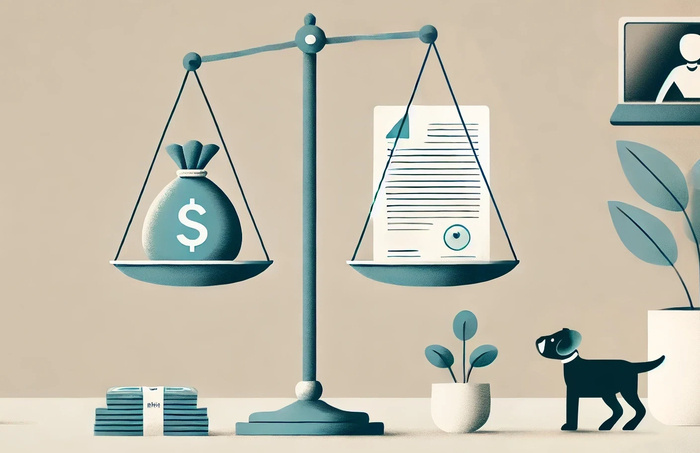
Imagine a company that prides itself on being a fast-paced, efficient content mill. In their rush to churn out content, they have dispensed with the services of a proofreader. At first, this sounded like a brilliant cost-cutting move. But it didn’t take long to realize how much their lack of a proofreader was costing them. Grammatical errors, misspellings, and factual inaccuracies in their text undermined client trust, leading to sagging sales and a tarnished reputation. Consequently, the business was compelled to reevaluate its choice and appoint a group of proofreaders. The cost of this decision was far less than the cost of the damage done by their error-ridden content.
Proofreaders are not mere spell-checkers or grammar police. They possess a keen eye for detail, an unwavering commitment to accuracy, and an intuitive understanding of language. They are the final gatekeepers who scrutinize every detail, ensuring that the written word conveys its intended message with impeccable accuracy.
In an era of digital communication and instant gratification, the demand for proofreading services has intensified. In this blog, we will explain why the need for accurate and well-written content has become paramount.
Who Is a Proofreader?
A proofreader is a professional who meticulously examines written material to identify and correct errors in grammar, spelling, punctuation, and formatting.
Their keen eye for detail ensures that written materials are polished, error-free, and meet the highest standards of accuracy and professionalism.
Proofreading plays a pivotal role in the quality of written communication. It safeguards against errors that can undermine the credibility and impact of the content. By meticulously reviewing and refining written materials, proofreaders enhance clarity, consistency, and readability.
Proofreading is essential for several reasons:
- Maintains professionalism. Error-free documents convey professionalism and attention to detail, enhancing the credibility of the writer and the organization.
- Ensures accuracy. Proofreaders verify the factual correctness of information, ensuring that readers receive reliable and trustworthy content.
- Improves clarity. By eliminating grammatical errors and ambiguity, proofreading makes it easier for readers to understand and engage with the written material.
- Enhances visual appeal. Well-proofread documents appear visually appealing, inviting readers to engage with the content and fostering a positive impression.
To ensure all of the above, a proofreader should possess a combination of essential qualities:
- Attention to detail. Proofreaders must have an eagle eye for even minute errors.
- Strong language skills. Proficiency in grammar, spelling, and punctuation is paramount.
- Analytical thinking. The ability to critically analyze written material is crucial for identifying potential errors.
- Excellent communication skills. Proofreaders need to be able to clearly convey their corrections and suggestions to authors.
- Methodical approach. A systematic and thorough approach ensures that all aspects of the document are meticulously reviewed.
- Technical proficiency. Familiarity with industry-specific software and tools is beneficial for efficient proofreading.
- Patience and accuracy. Proofreading requires a high level of patience and an unwavering commitment to accuracy.
Proofreaders must possess a discerning eye for detail, an unwavering commitment to accuracy, and a deep understanding of grammar and language conventions. They are highly organized and possess strong time management skills to meet deadlines efficiently. Additionally, effective proofreaders are meticulous, thorough, and show a passion for precision in their work.
Responsibilities of a Proofreader in an IT Company
In the realm of information technology, where precision and accuracy are paramount, proofreading plays a critical role in ensuring the quality and effectiveness of written content. Proofreaders in IT companies undertake various responsibilities to ensure that technical documentation, software user manuals, marketing materials, and other written deliverables meet the highest standards of clarity, readability, and accuracy.
The primary responsibilities of a proofreader are as follows:
- Review and proofread written materials. Examine manuscripts, technical whitepapers, code comments, and other documents for errors in grammar, spelling, punctuation, syntax, and formatting.
- Identify and correct errors. Spot and correct errors that may have escaped the attention of authors, editors, or other reviewers.
- Ensure consistency and style. Adhere to established company style guides and ensure that all written content conforms to the required format, tone, and level of formality.
- Verify accuracy. Fact-check technical information, references, and data to ensure that the content is accurate and up-to-date.
- Improve readability. Optimize the flow and structure of written content to enhance readability and comprehension for intended audiences.
In the digital field, when it comes to dealing with documents created by technical writers and developers, technical expertise becomes an essential quality of a proofreader and includes:
- Understanding of IT terminology and concepts. Possess a strong understanding of IT principles, concepts, and terminology to effectively review technical documentation.
- Proficiency in proofreading tools. Utilize proofreading software and other tools to assist in identifying and correcting errors efficiently.
- Ability to interpret technical diagrams and code. Interpret and proofread technical diagrams, flowcharts, and code snippets to ensure accuracy and clarity.
Additionally, an effective proofreader should excel in communication and collaboration:
- Communicate with authors and editors. Collaborate with authors, editors, and subject matter experts to discuss potential errors and suggest improvements.
- Provide constructive feedback. Provide clear and actionable feedback on identified issues, explaining errors and suggesting appropriate corrections.
- Maintain confidentiality. Handle sensitive information and confidential documents with discretion and adherence to company protocols.
Proofreading is a critical responsibility in an IT company, ensuring the accuracy and professionalism of all written materials. Proofreaders play a vital role in maintaining the company’s reputation by ensuring that all documents are free of errors and inconsistencies. They also contribute to the efficiency of the company by identifying and resolving issues early on, preventing costly mistakes and delays. Furthermore, proofreaders serve as quality gatekeepers, ensuring that only high-quality work is released to clients and stakeholders. Their attention to detail and commitment to accuracy are essential for the success and smooth operation of any IT company.
Skills and Qualifications of a Proofreader
As meticulous and discerning professionals, effective proofreaders possess an impeccable command of grammar, spelling, and punctuation. They scrutinize every word, phrase, and sentence for deviations from linguistic norms, detecting even the subtlest of errors that escape others’ notice.
Beyond their linguistic prowess, proofreaders exhibit unwavering attention to detail. They comb through documents, ensuring that every element is consistent and flawless. This meticulous approach ensures that documents emerge from their hands polished.
Proofreaders work diligently and independently, adhering steadfastly to deadlines. They are self-starters, capable of managing their time effectively and prioritizing tasks to meet demanding schedules. Their unwavering commitment to delivering high-quality work within specified timeframes makes them an invaluable asset to any team.
In addition to their foundational skills, proofreaders possess a deep understanding of style guides and formatting conventions. They are familiar with the nuances of different writing styles and genres, ensuring that documents conform to the highest standards of presentation. This expertise enables them to maintain consistency, clarity, and professionalism throughout their work.
Career Path of a Proofreader
Proofreading is a crucial aspect of the publishing and editing process, ensuring the accuracy and clarity of written content. Proofreaders play a vital role in producing high-quality written materials, from books and magazines to articles, websites, and academic papers. The career path of a proofreader typically involves the following steps:
Education and Training
Most proofreaders hold a bachelor’s degree in English, journalism, communications, or a related field. Some employers may prefer candidates with additional training or certification in proofreading, editing, or fact-checking.
Entry-Level Positions
Copy Editor. Entry-level proofreaders often start as copy editors, responsible for correcting errors in grammar, punctuation, spelling, and style.
Proofreader Assistant. Assisting experienced proofreaders by checking for errors and formatting issues.
Advancing to Proofreader
After gaining experience as a copy editor or proofreader assistant, individuals can advance to the role of proofreader. Proofreaders meticulously check documents for a wide range of errors, including grammar, punctuation, spelling, formatting, and consistency.
Senior Proofreader
Experienced proofreaders with exceptional skills and a proven track record may advance to the role of senior proofreader. Senior proofreaders may oversee junior proofreaders, train new staff, and implement quality control measures.
Management Positions
Highly skilled proofreaders with leadership and management experience may pursue management roles, such as:
- Editing Manager,
- Publications Manager, or
- Editorial Director.
The job outlook for proofreaders is expected to remain stable in the coming years. The demand for proofreading services will continue to grow as businesses and organizations prioritize the production of error-free and polished written content.

Proofreaders’ Salaries – What to Expect When Starting a Career?
Starting a proofreading career can be both exciting and challenging. A common concern among those who aspire to be proofreaders is “How much will I earn?” The answer varies greatly and is based on several factors, including experience, area of expertise, and market demand.
Entry-Level Expectations
For those just starting out, entry-level proofreading positions often offer salaries that reflect the initial learning and growth phase of the career. According to Indeed.com, the average base salary for proofreaders in the United States is $52,246 annually. However, this figure may be somewhat exaggerated. Glassdoor offers a more realistic view, stating that the estimated total pay for a proofreader is $49,809 per year in the United States, with a median total pay of $50k per year.
Despite these estimates, practicing proofreaders often report that starting salaries can range from $25,000 to $35,000 annually. These figures can be higher in certain industries, such as legal or technical publishing, where precision is paramount.
Freelance Versus In-House
The revenue trend of independent contractors can differ from that of internal proofreaders. While jobs inside companies offer a consistent salary, managing several clients and projects as a freelancer can potentially increase earnings. However, freelancers also have to deal with the uncertainty of freelancing and the ongoing need to promote their services.
Experience Pays Off
Proofreaders should anticipate higher pay as they gain more expertise. Experienced proofreaders with a solid portfolio and specialized knowledge can command higher fees, often exceeding $50,000 per year. Even greater demand may be experienced by proofreaders who are multilingual or who specialize in fields that are in high demand.
Geographical Variations
Salary is significantly influenced by location as well. Proofreaders in major cities or areas with a high concentration of publishing businesses typically make more money than proofreaders in more remote locations.
In summary, while starting salaries for proofreaders may not be exorbitant, there is room for growth and the potential for a rewarding career.
Online Proofreaders – Tools to Ensure Perfect Grammar, Spelling, and Punctuation
As proofreaders progress in their careers and earn higher salaries, leveraging the right tools can further enhance their efficiency and accuracy. Online proofreading tools can guard against slip-ups in grammar, spelling, and punctuation. Let us now look at the most notable of these tools, exploring the benefits they bring to our documentation, and the limitations they have.
- Grammarly is especially designed for those who seek real-time checks and writing enhancements. Its intuitive design and personalized feedback system make it a favorite, though it requires a premium subscription for the full suite of features and may occasionally misinterpret complex contexts.
- The Hemingway Editor is the minimalist’s choice, focusing on simplifying language and improving readability. It is a straightforward tool that does not demand ongoing subscriptions, but it won’t catch every grammatical nuance or offer plagiarism checks.
- ProWritingAid offers extensive reports and stylistic analyses. It is a tool that grows with you, though its wealth of information can be daunting at first, and unlocking its full potential comes at a cost.
- WhiteSmoke provides a multilingual approach to proofreading, with translation capabilities and writing templates that cater to a global audience. However, its interface may feel a bit outdated, and its suggestions are not always relevant.
- Lastly, Ginger helps you correct grammar mistakes, make spelling checks, rephrase sentences, and translate in over 40 languages. It is particularly friendly for those who are not native English speakers, though its free version is somewhat limited, and it may struggle with complex sentence structures.
Each of these tools has its own strengths and weaknesses, and the key is to find the one that best suits your individual writing style and needs.

Conclusion
Proofreading is a meticulous and essential task that ensures the accuracy, clarity, and professionalism of written content. Proofreaders play a crucial role in maintaining high standards of communication, helping writers present their ideas effectively and avoid costly errors. By carefully reviewing and correcting mistakes, proofreaders help businesses, organizations, and individuals communicate with confidence and credibility.
Whether you are a professional proofreader or want to hire one, understanding the role and responsibilities of a proofreader is key. By adhering to industry standards and using effective content creation techniques, you can ensure that your written content is polished, error-free, and ready to make a lasting impression on the users.
Good luck with your technical writing!
ClickHelp Team
Author, host, and deliver documentation across platforms and devices